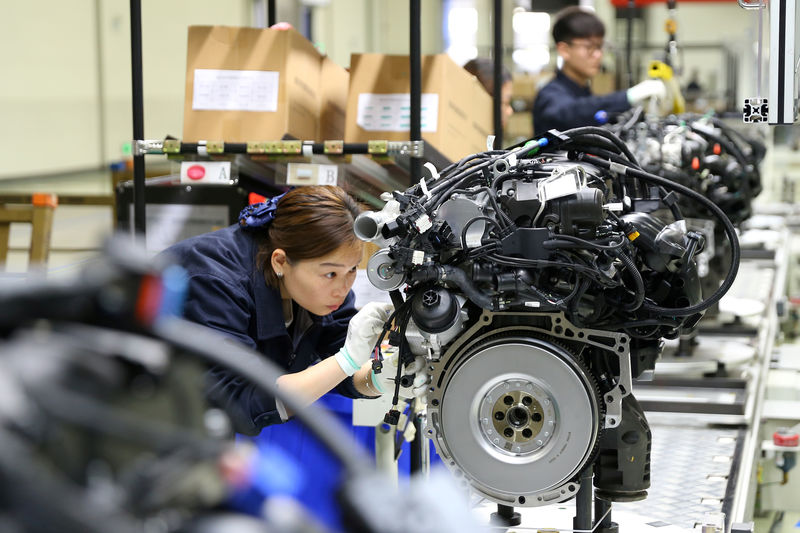By Kevin Yao and Yawen Chen
BEIJING (Reuters) - China reported surprisingly weaker growth in retail sales and industrial output for April on Wednesday, adding pressure on Beijing to roll out more stimulus as the trade war with the United States escalates.
Clothing sales fell for the first time since 2009, suggesting Chinese consumers were growing more worried about the economy even before a U.S. tariff hike on Friday heightened stress on the country's struggling exporters.
Overall retail sales in April rose 7.2% from a year earlier, the slowest pace since May 2003, data from the National Bureau of Statistics (NBS) showed. That undershot March's 8.7% and forecasts of 8.6%.
The data suggested consumers were now beginning to cut back spending on everyday products such as personal care and cosmetics, while continuing to shun more expensive items such as cars.
"Weak retail sales partially stemmed from a deterioration in employment and declining income of the middle-and-low income groups," said Nie Wen, an economist at Hwabao Trust.
"In terms of future policies to keep consumption as the stabilizer of the economy, China might roll out targeted tax cuts or subsidies to the middle-and-low income groups."
As a whole, Chinese data for April largely pointed to a loss of momentum, after surprisingly upbeat March readings had raised hopes the economy was slowly getting back onto firmer footing and would require less policy support.
Growth in industrial output slowed more than expected to 5.4% in April on-year, pulling back from a 4-1/2-year high of 8.5% in March, which some analysts had suspected was boosted by seasonal and temporary factors.
Analysts polled by Reuters had forecast output would grow 6.5%.
Motor vehicle production dropped nearly 16% as demand weakened, with sedan output slumping 18.8%, the steepest decline since September 2015. Industry data this week showed auto sales fell 14.6% in April, the 10th consecutive month of decline.
China's exports also unexpectedly shrank in April in the face of U.S. tariffs and weaker global demand, while new factory orders from at home and abroad remained sluggish.
"There are still uncertainties haunting the performance of the economy. Tensions between China and the U.S. have returned while concerns about insufficient demand worldwide are on the rise," Nie said.
Nie said China may need a more comprehensive cut in banks' reserve requirements in June before a G20 summit where Presidents Donald Trump and Xi Jinping are expected to discuss trade.
"The funding gap in the market is relatively large," Nie said, adding that smaller, more targeted reductions in bank reserves may no longer be enough to spur stronger growth.
There is relatively big room for policies to support growth, Liu Aihua, a spokeswoman at the statistics bureau, told reporters at a briefing, adding that employment is expected to remain steady.
The April nationwide survey-based jobless rate improved to 5.0% from 5.2% in March, though analysts are generally skeptical of Chinese employment data and see a rise in layoffs if export conditions deteriorate.
INVESTMENT
Adding to worries about domestic demand, Wednesday's data also showed an unexpected stumble in investment.
Fixed-asset investment growth slowed to 6.1% in the first four months of this year, dashing expectations for a slight rise to 6.4%.
Growth in infrastructure spending held steady at 4.4%, with a sharp slowdown in cement production possibly reflecting a slower-than-expected payoff from Beijing's efforts to fast-track road and rail projects.
China is trying to engineer a construction boom even as it steps up efforts to ease strains on smaller companies, ranging from tax cuts to financial incentives for firms which do not shed staff.
But private sector fixed-asset investment slowed sharply to 5.5% growth from 6.4%, suggesting the sector continues to face difficulties. The private sector accounts for the majority of jobs in China and about 60% of overall investment.
One of the few bright spots in the data was property investment, a key growth driver.
Real estate investment in April rose 12% from a year earlier, unchanged from March, according to Reuters calculations. But demand for new homes remained weak, weighing on sales of appliances and furniture.
TRADE TENSIONS
Washington dramatically escalated its 10-month tariff war with Beijing on Friday by raising levies on $200 billion of Chinese goods in the midst of trade talks, and Trump has threatened new levies on all remaining U.S. imports from China, sending global financial markets into a tailspin.
China retaliated on Monday, though on a smaller scale.
The two sides appear deadlocked in negotiations. But Trump softened his tone on Tuesday, insisting that talks between the world's two largest economies had not collapsed.
Economists at Citi estimate the U.S. tariff increase could lop 50 basis points off China's GDP growth, reduce exports by 2.7% and cost the country another 2.1 million jobs, though they are optimistic a trade deal will be reached eventually.
Analysts at BofA Merrill Lynch believe a prolonged period of brinkmanship would drag China's growth to 6.1% this year, from a near 30-year low of 6.6% in 2018.
They expect more policy easing in the short term, further cuts in banks' reserve requirements and another surge in bank lending, as well as consumer subsidies to boost sales of products such as cars, appliances and smartphones.
Some companies such as BMW have already lowered their prices after China cut the value-added tax (VAT) from April 1.
"We have full confidence in China's economic prospects," Geng Shuang, spokesman at the Chinese foreign ministry, said at a daily news briefing.

"U.S. protectionist and bullying actions will have some influences on the Chinese economy, but they can be completely overcome. If some people are not willing to do business with China, others will naturally fill this gap."